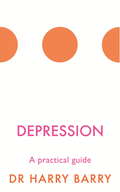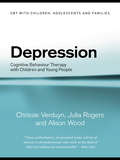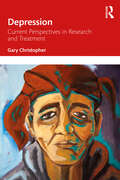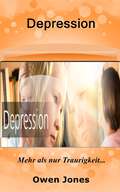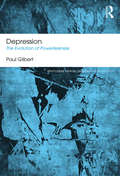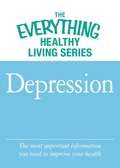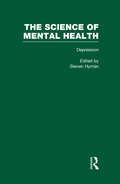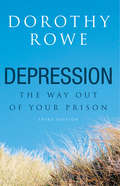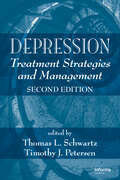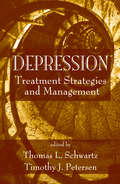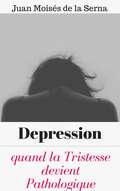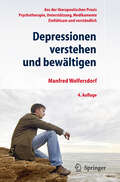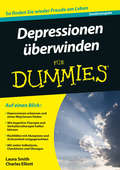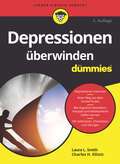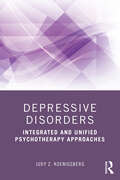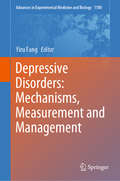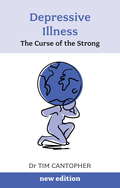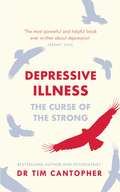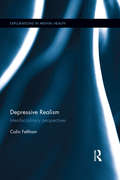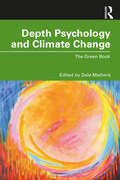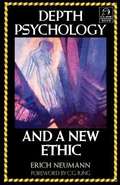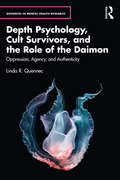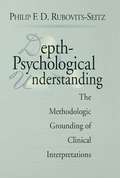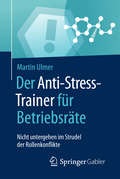- Table View
- List View
Depression: A practical guide (The\flag Ser. #2)
by Harry BarryA practical, four step programme to help you understand and cope with depression. As many as 1 in 4 British people have depression at any one time, and despite being so prevalent in our lives and communities, there is still lingering reluctance to talk about depression and its effects. In Depression: A practical guide, Dr Barry is determined to break the silence and provide practical advice to those suffering from depression as well as their families and friends. Dr Barry reveals a simple, four step programme to deal with depression, from beginning the journey, how to feel better, how to get better and how to stay well. He explores holistic approaches involving lifestyle as well as drug therapy, talk therapy (particularly CBT) and mindfulness.Previously published as Flagging Depression, this edition has been fully revised and updated.
Depression: Cognitive Behaviour Therapy with Children and Young People (CBT with Children, Adolescents and Families)
by Chrissie Verduyn Julia Rogers Alison WoodIn recent years there has been an increase in research into childhood depression, and it is now recognised that depression can severely impair young people in many aspects of their life, school, peer and social relationships, and frequently persists into adulthood. Depression: Cognitive Behaviour Therapy with Children and Young People provides an accessible guide to recognising and treating depression in young people. Based on a successful manual developed for research trials, this book presents an overview of a cognitive behavioural model for working with this age group, as well as practical ideas about how to start therapy. Topics covered include: engaging young people setting goals for therapy cognitive behaviour assessment and formulation solutions for problems practitioners may face encouraging parents and agencies to support therapy. Depression includes case examples and practical tips to prepare the practitioner for working with young people. Information is presented in a readable and practical style making this book ideal for professionals working in child and adolescent mental health services, as well as those in training. It will also be a useful guide for people working in community services for young people. Online resources: The appendices of this book contain worksheets that can be downloaded free of charge to purchasers of the print version. Please visit the website to find out more about this facility
Depression: Current Perspectives in Research and Treatment
by Gary ChristopherDepression, now recognized as a significant source of disability across the globe, is something many of us will be familiar with. This book explores the way people have discussed depression and examines how scientific understanding has led to ways to better appreciate and treat the condition. Through evaluations of contemporary research and literature, this book examines how depression has been depicted throughout history and presents an up-to-date account of how a diagnosis is made. Offering a narrative steeped in cognitive neuropsychology and emotion regulation, chapters explore the different theories behind current explanations of why depression develops and how this understanding drives the different ways to treat and manage the condition. It presents a holistic approach that considers depression in the context of physical health and how it impacts across the lifespan. This book is an essential read for practising and trainee clinical psychologists, but its accessible and readable style will appeal to a broader audience of those looking to further understand depression.
Depression: Mehr als nur Traurigkeit... (So geht's... Serie #77)
by Owen JonesDepression Mehr als nur Traurigkeit... Hallo und danke, dass Sie dieses Hörbuch mit dem Titel 'Depression' gekauft haben. Ich hoffe, dass Sie die Informationen hilfreich, nützlich und gewinnbringend finden werden. Bitte beachten Sie, dass ich den Inhalt dieses Hörbuchs nach umfangreichen Recherchen verfasst habe. Sie können dieses Hörbuch nirgendwo anders als bei mir kaufen. Sollten Sie feststellen, dass dies nicht der Fall ist, geben Sie mir bitte die URL der entsprechenden Seite, damit ich sie wegen Diebstahls sperren lassen kann. Die Informationen in diesem E-Book zu verschiedenen Aspekten der Depression und verwandten Themen sind in 15 Kapiteln von jeweils etwa 500-600 Wörtern gegliedert. Ich hoffe, dass es für diejenigen interessant ist, die sich mit ihren Problemen mit Depressionen in all ihren Formen beschäftigen. Als zusätzlichen Bonus erteile ich Ihnen die Erlaubnis, den Inhalt auf Ihrer eigenen Website oder in Ihren eigenen Blogs und Newslettern zu verwenden, obwohl es besser ist, wenn Sie sie zuerst in Ihren eigenen Worten umschreiben. Sie dürfen, wenn Sie das E-Book gekauft haben, das Buch auch aufteilen und die Artikel weiterverkaufen. Das einzige Recht, das Sie nicht haben, ist, das Buch so weiterzuverkaufen oder zu verschenken, wie es Ihnen geliefert wurde. Wenn Sie eine Rückmeldung haben, wenden Sie sich bitte an das Unternehmen, bei dem Sie das Buch gekauft haben. Dort können Sie auch weitere Bücher wie dieses finden. Nochmals vielen Dank für den Kauf dieses Buchs, Mit freundlichen Grüßen Owen Jones
Depression: The Evolution of Powerlessness (Routledge Mental Health Classic Editions)
by Paul GilbertDepression: The Evolution of Powerlessness offers a fresh perspective on research, theory and conceptualisations of the depressive disorders, derived from evolution theory and arguing for the adoption of the biopsychosocial model. The book is split into three parts. Part I explores the major distinctions between all types of depression and Part II offers an overview of evolution theory and its application to depression. Part III covers the major theories of depression; theories are compared and contrasted, highlighting controversies, weaknesses and strengths, and where cross fertilisation of ideas may be beneficial. The final chapter outlines why simple theories of aetiology are inadequate and explores the role of culture and social relationships as elicitors of many forms of depression. This Classic Edition, with a new introduction from the author, brings Paul Gilbert's early work to a new audience, and will be of interest to clinicians, researchers and historians in the field of psychology.
Depression: The Most Important Information You Need to Improve Your Health (The Everything Healthy Living Series )
by Adams MediaIf you or a family member is suffering from depression, you may feel overwhelmed by the challenges associated with this condition. The Everything® Healthy Living Series is here to help. These concise, thoughtful guides offer the expert advice and the latest medical information you need to manage your pain and lead a healthy life.Inside you’ll find expert advice and helpful tips on understanding depression, seeking professional help, various treatment options, and thoughtful guidance on helping family and friends understand your condition. Living with depression can be challenging, but with the right guidance you can live a happy and healthy life.
Depression: The Science of Mental Health
by Steven HymanFirst Published in 2002. In common usage, the term "depression" can refer to the state of being sad or blue, but it also signifies a serious clinical syndrome that affects approximately 10 percent of people at some point in their lives. This clinical syndrome may occur as a primary illness or as a complication of ("secondary to") another mental disorder such as schizophrenia, a medical condition such as hypothyroidism, or the effects of a drug. Based on studies of clinical courses and outcomes, treatment responses, and familial patterns of depression, primary depressive illness is dichotomized into unipolar (depressions only) and bipolar. In bipolar disorder, or manic-depressive illness, depressions are interspersed with manias- periods of elevated mood, high energy, and lack of sleep. Bipolar disorder is described in a separate volume.
Depression: The Way Out of Your Prison
by Dorothy RoweDepression: The Way Out of Your Prison gives us a way of understanding our depression which matches our experience and which enables us to take charge of our life and change it. Dorothy Rowe shows us that depression is not an illness or a mental disorder but a defence against pain and fear, which we can use whenever we suffer a disaster and discover that our life is not what we thought it was. Depression is an unwanted consequence of how we see ourselves and the world. By understanding how we have interpreted events in our life we can choose to change our interpretations and thus create for ourselves a happier, more fulfilling life. Depression: The Way Out of Your Prison is for depressed people, their family and friends, and for all professionals and non-professionals who work with depressed people.
Depression: Treatment Strategies and Management (Medical Psychiatry Series)
by Nestor Galvez-JimenezThis updated and revised Second Edition provides a state-of-the-science review and clinical collection of research on treating depression with multiple therapies. The text is an essential guide for those who prescribe psychotropics or perform psychotherapy, including psychiatrists, residents, psychologists, and psychopharmacologists. Containing res
Depression: Treatment Strategies and Management (Medical Psychiatry Series)
by Thomas L. Schwartz Timothy J. PetersenGuiding clinicians toward the most effective treatment regimens, this reference offers detailed coverage of the symptomatology, diagnosis, epidemiology, and etiology of depression. A must-have tool for anyone prescribing psychotropics or performing psychotherapy, this source expertly reviews research and clinical data regarding acute and long-term
Depression: quand la Tristesse devient Pathologique
by Juan Moisés de la Serna Celia SimonLes aléas de la vie, positifs et négatifs, influencent aussi bien notre mode de pensées et notre attitude que notre état mental. La tristesse apparait généralement à la suite d'une perte, d'une expérience négative ou simplement d'attentes déçues. Cette tristesse peut être passagère et s'estomper au bout de quelques heures, quelques jours ou quelques semaines. Cependant, si elle perdure et commence à affecter notre ressenti, nos pensées et notre comportement, il se pourrait alors que nous soyions face à un problème plus grave: la Dépression.
Depressionen verstehen und bewältigen
by Manfred WolfersdorfDie Depression ist keine ausweglose Erkrankung - Hilfe und Heilung sind möglich. Der Autor macht das depressive Erleben anhand von Beispielen nachfühlbar und erklärt die Ursachen. Ausführlich geht er auf Behandlungsmöglichkeiten und die Wirkungen von Antidepressiva ein. Er gibt viele praktische Hinweise für Patienten und Angehörige, u. a. wann es sinnvoll ist, den Arbeitgeber zu informieren und was Angehörige und Freunde zur Unterstützung tun können. Anhang mit Depressionsstationen in Deutschland und der Schweiz sowie Liste der Psychopharmaka.
Depressionen überwinden für Dummies (Für Dummies)
by Laura L. Smith Charles H. ElliottSchieben Sie die dunklen Wolken beiseite und erfahren Sie neue Lebensfreude Dieses Buch hilft, wenn Ihnen alles bleischwer erscheint und Sie die Welt nur noch wie durch einen Schleier wahrnehmen. An Depressionen leiden viele Menschen, Sie sind nicht alleine. Charles Elliot und Laura Smith beschreiben Betroffenen und deren Angehörigen leicht verständlich und einfühlsam die verschiedenen Formen von Depression. Sie zeigen Ihnen mit Checklisten, Selbsttests und Übungen, was Sie tun können, um dunkle Gedanken zu überwinden. Sie erfahren, wie die traditionelle Medizin auf diesem Weg helfen kann und wo Sie professionelle Hilfe finden. Außerdem erhalten Sie Tipps, wie kleine Änderungen im Alltag Symptome lindern und Lebensfreude zurückbringen.
Depressionen überwinden für Dummies (Für Dummies)
by Laura L. Smith Charles H. ElliottCharles Elliot und Laura Smith, klinische Psychologen mit langjähriger Erfahrung, beschreiben leicht verständlich und einfühlsam die verschiedenen Formen von Depressionen. Sie zeigen Ihnen mit Schritt-für-Schritt-Anleitungen, Selbsttests und Übungen, was Sie tun können, um Ihre dunklen Gedanken zu überwinden und die Welt mit anderen Augen zu betrachten. Außerdem geben sie Tipps, wie kleine Änderungen im Alltag Ihre Symptome lindern und Ihnen Lebensfreude zurückbringen. Sie erfahren auch, wie die traditionelle oder alternative Medizin Sie auf diesem Weg unterstützen kann und wo Sie professionelle Hilfe finden.
Depressive Disorders: Integrated and Unified Psychotherapy Approaches
by Judy Z. KoenigsbergDepressive Disorders uses an integrative view to explore the etiology of depression, its development, and maintenance and highlights contemporary unified psychotherapy approaches. The text includes case examples that illustrate how to use integrated and unified psychotherapy approaches to help patients with depressive disorders. Dr. Koenigsberg demonstrates how research-based approaches may be used to treat individuals with different types of depressive disorders, such as major depressive disorder, persistent depressive disorder, bipolar disorder, cyclothymia, and adjustment disorder with depression. It encourages therapists to recognize that the complex themes of the depressive disorders may be more fully realized within the context of integrated and unified psychotherapy perspectives. This text is essential for early-career and seasoned therapists, graduate students, and psychotherapy researchers who wish to explore the past and contemporary history of psychotherapy approaches in order to understand the depressive disorders.
Depressive Disorders: Mechanisms, Measurement and Management (Advances in Experimental Medicine and Biology #1180)
by Yiru FangThis book offers a state-of-the-art report on recent discoveries concerning the basic and clinical, neuroscientific and psychiatric findings in depression research. Depressive disorder is a severe and recurrent brain disorder that can manifest in depressive mood, somatic symptoms and cognitive impairment. The underlying mechanisms of depressive disorder and its clinical practice are subjects of long-standing interests. This book is a biologically plausible and multilevel theory which describes neural, physiological, molecular and genomic mechanisms that drive depression pathogenesis, as well as navigates the clinical practice and management for depressive disorder. It mainly describes advances made over the past 20 years on the neural, molecular, neuroimaging, physiology, pathophysiology, pharmacology and internet-based measurement and management of depressive disorder. It will help postgraduate students and academic researchers to get either basic or clinical picture of depressive disorder. Also, it may benefit pharmaceutical companies for developing novel drugs to treat this disease.
Depressive Illness: The Curse Of The Strong
by Tim CantopherThis book has helped many thousands of those who have depression. This new edition, written by a leading consultant psychiatrist, explains that depression tests the strongest of us. Dr Cantopher guides the reader through the nature of depression, its history, symptoms, causes and treatments. He covers the latest information on medications, new guidelines as to the management of depression, and stresses that no one should be to blame for succumbing to depression.
Depressive Illness: The Curse Of The Strong
by Tim Cantopher'People affected by depression tell me this is the most powerful and helpful book ever written on the topic. I keep meeting people who say this book changed their lives.' - Jeremy Vine, BBC Radio 2Do you have depression?Firstly, stop blaming yourself.Secondly, don't struggle on alone - read this book instead. It has helped thousands of people just like you.Dr Tim Cantopher knows two essential truths about depression and depressive illness. One: it's strong people who are most vulnerable to it; people whose standards are high, whose ethics are powerful, who want their lives to be meaningful. Strong people, like you.Two: depression is a physical illness, and this book explains just that. Depressive Illness will explain all the above in detail, and more importantly, give you effective ways to get well and stay well. It covers symptoms, what to do when you get ill, medication, recovery, lifestyle changes, psychotherapy and problem-solving skills, including mindfulness. Most of all, take heart - people recover from depressive illness and remain mentally well, and you can, too.
Depressive Illness: The Curse Of The Strong
by Tim Cantopher'People affected by depression tell me this is the most powerful and helpful book ever written on the topic. I keep meeting people who say this book changed their lives.' - Jeremy Vine, BBC Radio 2Do you have depression?Firstly, stop blaming yourself.Secondly, don't struggle on alone - read this book instead. It has helped thousands of people just like you.Dr Tim Cantopher knows two essential truths about depression and depressive illness. One: it's strong people who are most vulnerable to it; people whose standards are high, whose ethics are powerful, who want their lives to be meaningful. Strong people, like you.Two: depression is a physical illness, and this book explains just that. Depressive Illness will explain all the above in detail, and more importantly, give you effective ways to get well and stay well. It covers symptoms, what to do when you get ill, medication, recovery, lifestyle changes, psychotherapy and problem-solving skills, including mindfulness. Most of all, take heart - people recover from depressive illness and remain mentally well, and you can, too.
Depressive Realism: Interdisciplinary perspectives (Explorations in Mental Health)
by Colin FelthamDepressive Realism argues that people with mild-to-moderate depression have a more accurate perception of reality than non-depressives. Depressive realism is a worldview of human existence that is essentially negative, and which challenges assumptions about the value of life and the institutions claiming to answer life’s problems. Drawing from central observations from various disciplines, this book argues that a radical honesty about human suffering might initiate wholly new ways of thinking, in everyday life and in clinical practice for mental health, as well as in academia. Divided into sections that reflect depressive realism as a worldview spanning all academic disciplines, chapters provide examples from psychology, psychotherapy, philosophy and more to suggest ways in which depressive realism can critique each discipline and academia overall. This book challenges the tacit hegemony of contemporary positive thinking, as well as the standard assumption in cognitive behavioural therapy that depressed individuals must have cognitive distortions. It also appeals to the utility of depressive realism for its insights, its pursuit of truth, as well its emphasis on the importance of learning from negativity and failure. Arguments against depressive realism are also explored. This book makes an important contribution to our understanding of depressive realism within an interdisciplinary context. It will be of key interest to academics, researchers and postgraduates in the fields of psychology, mental health, psychotherapy, history and philosophy. It will also be of great interest to psychologists, psychotherapists and counsellors.
Depth Psychology and Climate Change: The Green Book
by Dale MathersDepth Psychology and Climate Change offers a sensitive and insightful look at how ideas from depth psychology can move us beyond psychological overwhelm when facing the ecological disaster of climate change and its denial. Integrating ideas from disciplines including anthropology, politics, spirituality, mythology and philosophy, contributors consider how climate change affects psychological well-being and how we can place hope and radical uncertainty alongside rage and despair. The book explores symbols of transformation, myths and futures; and is structured to encourage regular reflection. Each contributor brings their own perspective – green politics, change and loss, climate change denial, consumerism and our connection to nature – suggesting responses to mental suffering arising from an unstable and uncertain international outlook. They examine how subsequent changes in consciousness can develop. This book will be essential reading for analytical psychologists, Jungian analysts and psychotherapists, as well as academics and students of Jungian and post-Jungian studies. It will also be of great interest to academics and students of the politics and policy of climate change, anthropology, myth and symbolism and ecopsychology, and to anyone seeking a new perspective on the climate emergency.
Depth Psychology and a New Ethic
by C. G. Jung Gerhard Adler Erich Neumann James Yandell Micha NeumannThe modern world has witnessed a dramatic breakthrough of the dark, negative forces of human nature. The "old ethic," which pursued an illusory perfection by repressing the dark side, has lost its power to deal with contemporary problems. Erich Neumann was convinced that the deadliest peril now confronting humanity lay in the "scapegoat" psychology associated with the old ethic. We are in the grip of this psychology when we project our own dark shadow onto an individual or group identified as our "enemy," failing to see it in ourselves. The only effective alternative to this dangerous shadow projection is shadow recognition, acknowledgement, and integration into the totality of the self. Wholeness, not perfection, is the goal of the new ethic.
Depth Psychology, Cult Survivors, and the Role of the Daimon: Oppression, Agency, and Authenticity (Advances in Mental Health Research)
by Linda R. QuennecThis book explores the possibilities that exist for navigating out of and away from multiple levels of oppression through memoir-based research. It considers how those raised in oppressive, high-demand communities, colloquially referred to as “cults,” can emancipate themselves from controls and expectations inculcated from early childhood and examines processes surrounding the psychological reclamation of self. Exploring and metaphorically tending to an orienting psychological dynamic that the ancient Greeks related to as “the daimon” and using the perspectives of Jungian and post-Jungian depth psychology, the author investigates how subjects can reclaim agency and avoid excessive control over their thoughts, attention, and life’s intentions. They suggest that depth psychologically oriented modes can be used to this attunement and explore this notion through a study of memoirs of individuals who were raised in “cults.” Suggesting a more aligned approach to working with varying levels of psychological constraint and utilizing a phenomenological hermeneutic study, it will appeal to scholars and professionals in depth psychology and other psychological orientations, as well as individuals who are interested in more deeply understanding the psychological mechanisms involved in leaving a high-demand group or other oppressive situations.
Depth-Psychological Understanding: The Methodologic Grounding of Clinical Interpretations
by Philip F. Rubovits-SeitzAlthough clinical interpretation originated with Freud, the latter's positivist preference for purely observational methods made him ambivalent toward interpretive methods. According to Rubovits-Seitz, the legacy of Freud's positivism still pervades clinical thinking and interferes with progress in investigating and improving interpretive methods. He reviews the paradigm shift in general science from positivism to postpositivism by way of demonstrating the compatibility of interpretive inquiry with a postpositivist approach. Post-Freudian models of clinical interpretation are evaluated, andclinical methods of interpretation are compared with interpretive approachesin nonclinical fields. A detailed discussion of the neglected problem ofjustifying interpretations incorporates evaluations of specific justifyingprocedures and a case report illustrating applications of such methods. Thework concludes with a consideration of common but avoidable errors in clinicalinterpretation along with remedial strategies for dealing with them. Following Depth-Psychological Understanding, clinicians may no longer take for granted the interpretive process and the accuracy of their own interpretations. Rubovits-Seitz's scholarly survey marks a major advance in comprehending the methodology of clinical interpretation and in setting forth both the problems and promise of interpretive methods.
Der Anti-Stress-Trainer für Betriebsräte
by Peter Buchenau Martin UlmerDieses Buch aus der Anti-Stress-Trainer-Reihe beschäftigt sich mit den spezifischen Stressfaktoren im Arbeitsalltag von Betriebsräten und deren effizienter Bewältigung. Betriebsräte sind als Vermittler zwischen Arbeitgeber und Arbeitnehmer einer Vielzahl von Rollenkonflikten ausgesetzt. Auch die hohe Erwartungshaltung an ihr fachliches wie therapeutisches Know-how führt zu einem hohen Stresslevel. In diesem Buch lernen sie, wie sie diese Anforderungen erfolgreich zu managen, indem sie ihre eigene innere Balance bewahren. Der Autor geht gezielt auf die wichtigen Bereiche Stressprävention und Stressbewältigung ein und bietet einen informativen Überblick zum Thema Stress bei Betriebsräten.
